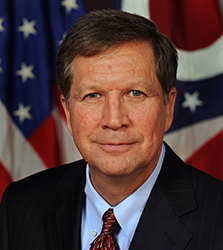
Why Are Republican Governors Struggling?
The Republican Party has traditionally favored governors (sitting or former) as presidential nominees, with vice presidents also getting significant consideration. In the past 50 years the Republican Party nominated exactly three presidential candidates who hadn’t been either a governor or vice president, all three of whom were crushed in the general election. Setting aside incumbent presidents, every Republican nominee who was either a governor or vice president won.
So we note with some interest that the first three candidates to drop out of the Republican field in 2016 are governors, all of them accomplished and with views that would seem attractive to the party’s base, while the remaining governors seem to be struggling to varying degrees. Alex Roarty of National Journal, in an illuminating piece, thinks he may have the answer:
Why Governors Are Struggling in the 2016 Race
In a primary that has defied prognostication, one of the biggest surprises yet has been the failure of any Republican governor, former or current, to break through to the top of the field. Each of them has dropped either to the lower rungs of the polls or out of the race entirely—a fact underscored Tuesday when Louisiana Gov. Bobby Jindal unceremoniously ended his struggling candidacy.
He was the third major Republican candidate to quit the race, joining former Texas Gov. Rick Perry and current Wisconsin Gov. Scott Walker. And they fared only marginally worse than the three viable governors who remain—Jeb Bush, Chris Christie, and John Kasich—each of whom has run a disappointing campaign that has made them, for the time being, long shots.
There are also three former governors still in the race who don’t, in Roarty’s view at least, even qualify as long shots: Jim Gilmore of Virginia, Mike Huckabee of Arkansas, and George Pataki of New York.
Of those six remaining governors, all but Bush have struggled to qualify for the main debate stage or, in some cases, the secondary stage for low-polling candidates.
So why has such a traditional stepping stone to the presidency proven so inadequate now? The reason, senior Republican strategists say, lies in a fundamental change within an angry Republican electorate and a host of candidates—Donald Trump, Ben Carson, Marco Rubio, and Ted Cruz—whose background and talents are better suited to take advantage. The usual advantages enjoyed by governors running for the White House, such as a record of accomplishments or status as a Washington outsider, simply no longer rate.
“We are into an age where it seems like your ability to get yourself on cable news and be a rock star in a reality-TV era matters more than what you’ve accomplished in a state like Texas or New Jersey or Florida,” said Henry Barbour, a committeeman for the Republican National Committee and an informal adviser to Rick Perry’s campaign. “It’s tough, and it’s not good, but it is reality. And campaigns have to deal with what the voters are looking for.”
In such an environment, what someone has accomplished in office has little appeal to many primary voters, and may even be a negative simply for the fact of having held office:
It’s not as if [Bush, Christie and Kasich], or the three candidates who have left the race, have nothing to talk about: Walker waged a high-profile fight to neuter unions in Wisconsin, Perry led the loud and proud conservative state in the country for more than a decade, and Bush—often derided by activists as a squish—was only recently considered the country’s most conservative governor. Jindal cut spending, while Kasich and Christie have led conservative reform in states with a strong Democratic presence.
Voters just didn’t care—in part, because their disgust with the political system has made them mistrustful of anything an elected official says. Wes Anderson, a top strategist and pollster for the Jindal campaign, said focus groups and surveys conducted by the campaign showed that voters liked the individual parts of Jindal’s record. They just reflexively didn’t believe him when he talked about it.
“In this very strange and convoluted election cycle, the Republican primary voters have said, ‘If you’re in elected office, then I discount what you’re saying,’” said Anderson.
Roarty’s piece helps to explain some of the struggles of the governors in the race, although these candidates would still have faced serious challenges regardless of the factors described here. Looking just at the three who have dropped out, it’s almost certain Perry would still have struggled to overcome his 2012 campaign’s legacy; Jindal would have still been a little-known governor seeking the votes of social conservatives, who have an abundance of choices in 2016; and Walker would still have been a relatively bland speaker serving as his own political consultant.
The remaining governors have their own issues as well, but it seems likely that their shortcomings are magnified by the television-driven dynamic favoring the non-governors in the race, whose own problems are diminished by the dynamic. So long as this continues, it seems likely the Republicans will nominate someone in 2016 who does not have the executive experience that historically has meant success.



